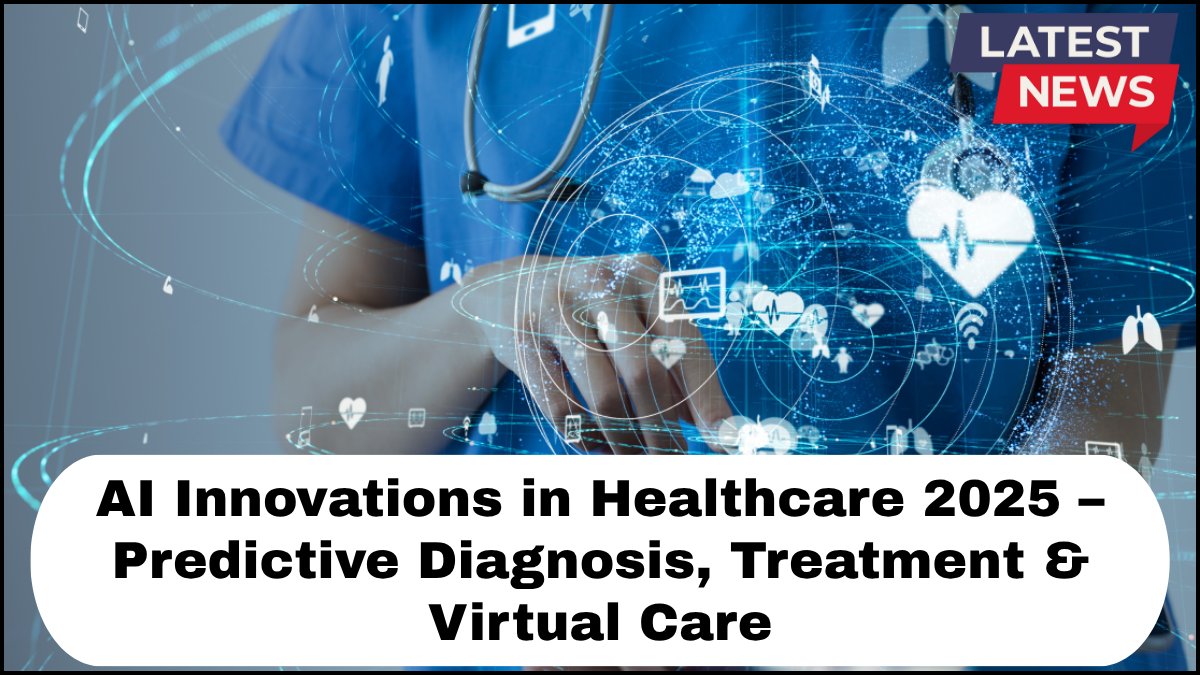Artificial Intelligence (AI) is driving a seismic shift in healthcare, transforming everything from early diagnosis to patient care delivery. As of 2025, AI in healthcare innovations have become more sophisticated, predictive, and patient-centric. These advancements are not just theoretical — they’re actively reshaping the medical field with real-world applications that improve outcomes, reduce costs, and empower both patients and clinicians.

Predictive Diagnosis: From Symptoms to Insights
Disease prediction with AI is no longer limited to theoretical models. In 2025, healthcare systems are integrating AI algorithms that analyze vast datasets — including genetic information, medical history, environmental factors, and lifestyle patterns — to identify risk factors and predict potential health conditions before symptoms appear.
For example, AI tools now assist primary care physicians by flagging early signs of diseases like diabetes, heart failure, and various cancers. Machine learning models trained on millions of health records can detect subtle biomarker patterns that would be invisible to the human eye. Hospitals are using these systems to prioritize high-risk patients, tailor preventive care plans, and intervene before the condition progresses.
One standout case is Mayo Clinic’s AI-driven cardiac risk predictor, which uses ECG data and deep learning to forecast the likelihood of heart conditions with over 90% accuracy — months or even years in advance.
AI-Driven Personalized Treatment Plans
Gone are the days of one-size-fits-all treatments. AI is enabling hyper-personalized care based on real-time patient data and predictive models. In 2025, clinicians rely on AI-powered platforms that recommend optimized treatment pathways based on a patient’s unique biology, genetics, and medical history.
For instance, oncologists now use AI to determine the most effective chemotherapy regimens for cancer patients by analyzing tumor genetics and comparing treatment outcomes across thousands of cases. This precision medicine approach leads to better results and fewer side effects.
AI also supports continuous learning in medicine. Algorithms update themselves with new clinical trials, drug interactions, and emerging therapies, ensuring that treatment recommendations stay cutting-edge.
Virtual Care Powered by Intelligent Systems
Virtual care has evolved far beyond video consultations. In 2025, AI underpins advanced telemedicine ecosystems that provide continuous, personalized support to patients remotely. Smart virtual assistants monitor symptoms, answer health-related questions, remind patients to take medication, and even escalate cases to human doctors when needed.
These systems integrate with wearable devices that track vitals in real time. For example, AI analyzes data from a smartwatch to detect arrhythmias or fluctuations in blood sugar levels, triggering alerts or remote interventions when necessary.
Chronic disease management is one of the biggest beneficiaries. Diabetic patients, for instance, are using AI apps that adjust insulin dosage recommendations in real time based on food intake, activity level, and blood glucose readings.
Interoperability and AI-Driven Health Records
AI also plays a critical role in streamlining patient data through interoperable electronic health records (EHRs). In 2025, hospitals and clinics are leveraging AI to automatically structure and standardize patient information across multiple systems, reducing administrative burden and enabling faster, more informed decision-making.
Natural language processing (NLP) is used to extract relevant details from physician notes, imaging reports, and lab results — converting unstructured data into actionable insights. This not only saves time but also ensures critical information doesn’t get missed.
Ethical Considerations and Responsible AI Use
As AI in healthcare innovations continue to expand, so does the need for ethical oversight. Healthcare providers are prioritizing transparency, data security, and algorithmic fairness. In 2025, many hospitals have dedicated AI ethics boards to evaluate the use and impact of intelligent systems in clinical care.
Explainable AI (XAI) is becoming a standard requirement. Clinicians and patients alike need to understand how AI tools arrive at their recommendations, ensuring trust and accountability in life-and-death decisions.
FAQs
What are the top AI innovations in healthcare in 2025?
Some of the leading innovations include predictive diagnosis tools, AI-assisted personalized treatment plans, intelligent virtual care platforms, and real-time health monitoring using wearable devices.
How is disease prediction with AI changing healthcare?
AI is revolutionizing early detection by identifying patterns in genetic, clinical, and lifestyle data that point to future disease risk. This allows for timely interventions and preventive care strategies.
Are AI-driven treatments more effective than traditional methods?
In many cases, yes. Personalized AI-guided treatments improve accuracy, reduce trial-and-error, and adapt to each patient’s unique profile, leading to better clinical outcomes.
Is AI replacing doctors?
No, AI is augmenting doctors — not replacing them. It helps with data analysis, early detection, and treatment recommendations, freeing up clinicians to focus more on patient interaction and complex decision-making.
Is virtual care with AI safe?
When implemented with proper oversight and security protocols, AI-enabled virtual care is not only safe but also effective in managing chronic conditions and improving access to healthcare services.
click here to learn more
